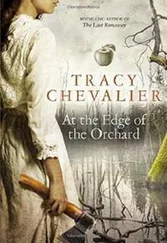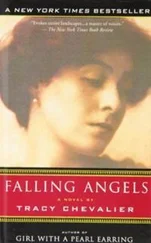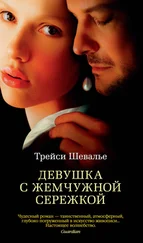He strode up to me, took my head in his large hands and kissed my cheeks three times.
‘Ella, you look just like your father,’ he said, using the familiar form, in clear French.
I grinned up at him. ‘Ah, then I must look like you, because you look just like my father!’
He picked up my bag, put his arm around me and led me down a flight of stairs and out to the street. He swung my bag in a wide semicircle as he gestured with his whole arm. ‘ Bienvenue à Moutier! ’ he cried.
I took a step forward and just managed to say ‘ C'est très -’ before I fell to the ground.
I woke up in a white room, small and rectangular and plain, like a monk's cell, with a bed, table, chair and bureau. Behind my head was a window; when I rolled my eyes back to look out, I could see upside-down the white steeple of a church, the black clock face on it partially obscured by a tree.
Jacob was sitting in the chair next to the bed; a strange man with a round face hovered in the doorway. I lay looking at them, unable to speak. Jacob said gently, ‘ Ella, tu t'es évanouiée .’ I'd never heard the word he used, but I understood immediately what he meant. ‘Lucien -’ he gestured behind him at the man – ‘was passing in his truck just then and he brought you here. We were worried because you were unconscious for a long time.’
‘How long?’ I struggled to sit up and Jacob gripped my shoulders to help me.
‘Ten minutes. All the way in the car and into the house.’
I shook my head slowly. ‘I don't remember a thing.’
Lucien stepped forward with a glass of water and handed it to me.
‘ Merci ,’ I murmured. He smiled in reply, barely moving his lips. I sipped it, then felt my face; it was wet and sticky. ‘Why is my face wet?’
Jacob and Lucien glanced at each other. ‘You were crying,’ Jacob replied.
‘While I was unconscious?’
He nodded and I became aware of my sore, runny nose, my hoarse throat, my exhaustion.
‘Was I talking?’
‘You were reciting something.’
‘ J'ai mis en toi mon espérance: Garde-moi, donc, Seigneur . Yes?’
‘Yes,’ Lucien replied. ‘That was -’
‘You need to sleep,’ Jacob interrupted. ‘Just rest. We'll talk later.’ He pulled a thin blanket over me. Lucien raised his hand in a motionless wave. I nodded and he disappeared.
I closed my eyes, then opened them just as Jacob was closing the door. ‘Jacob, does this house have shutters?’
He paused and tipped his head into the room. ‘Yes, but I never use them. I don't like them.’ He smiled and shut the door.
* * *
It was dark when I next woke, sweaty and disoriented. Outside there were windows lit up all around; it seemed that no one used their shutters here. The church steeple was spotlit. At that moment the bells in the tower began to chime and I automatically followed them, counting to ten: I'd been asleep four hours. It felt like days.
I reached over and switched on the bedside lamp. The shade was yellow and cast a soft golden light around the room. I had never been in a room with no decoration whatsoever; the spareness was oddly comforting. I lay for a while, studying the way the light fell, not sure that I wanted to get up. But I did finally, leaving the room and feeling my way down the dark stairs. At the bottom I stood in a square hallway facing three closed doors. I chose one with a string of light along the bottom and opened it into a bright kitchen painted yellow, with a polished wood floor and a bank of windows along one wall. Jacob was sitting at a round wooden table reading a newspaper propped against a bowl of peaches. A young woman with dark frizzy hair leaned into the kitchen sink, scrubbing at a pan. When she turned at my entrance I knew she must be related to Jacob: she had the same gaunt face and pointed chin, softened by wisps of hair on her forehead and long lashes around the same brown eyes. She was taller than me and very slight, with long thin hands and small wrists.
‘Ah, Ella, there you are,’ Jacob said as the woman kissed me three times. ‘This is my daughter, Susanne.’
I smiled at her. ‘I'm sorry,’ I said to them both. ‘I didn't realize it was so late. I don't know what was wrong with me.’
‘It's nothing. You needed to sleep. Will you eat something now?’ Jacob pulled out a chair for me at the table. Then he and Susanne began to set out cheese and salami, bread, olives and salad. It was exactly what I wanted, something simple. I didn't want them fussing over me.
We said little as we ate. Susanne asked me in French as clear as her father's if I would drink some wine, and Jacob remarked on the cheese, but otherwise we were silent.
When we had pushed our plates aside and Jacob had refilled my glass, Susanne slipped out of the room. ‘Do you feel better?’ he asked.
‘Yes.’
From another room a delicate music began, like a piano but stringier. Jacob listened for a moment. ‘Scarlatti,’ he said with pleasure. ‘Susanne studies harpsichord at the Concertgebouw in Amsterdam, you see.’
‘Are you a musician too?’
He nodded. ‘I teach at the music school here, just up the hill.’ He gestured behind him.
‘What do you play?’
‘Many things, but I teach mostly piano and flute here. The boys all want to play guitar, the girls flute, all of them violin or recorder. A few piano.’
‘Are there good students?’
He shrugged. ‘Most take lessons because their parents want them to. They have other interests too, horses or football or skiing. Every winter four or five children break their arms skiing and can't play. There is one boy, a pianist, who plays very good Bach. He may go on to study elsewhere.’
‘Did Susanne study with you?’
He shook his head. ‘With my wife.’
My father had told me Jacob's wife was dead, but I couldn't remember how long ago or the circumstances.
‘Cancer,’ he said, as if I'd asked him aloud. ‘She died five years ago.’
‘I'm sorry,’ I said. Feeling the inadequacy of the words, I added, ‘You miss her still, yes?’
He smiled sadly. ‘Of course. You are married yourself?’
‘Yes,’ I replied uncomfortably, then changed the subject. ‘Would you like to see the Bible now?’
‘Let's wait until the morning when the light is better. Now, you look better but you're still pale. Are you pregnant, maybe?’
I flinched, astonished that he asked me so casually. ‘No, no, I'm not. I – I don't know why I fainted but it's not that. I haven't been sleeping well for the last few months. And hardly at all last night.’ I stopped, remembering Jean-Paul's bed, and shook my head slowly. It was impossible to describe my situation to him.
We'd obviously entered shaky territory; Jacob saved us by pointedly changing the subject.
‘What do you do for work?’
‘I'm a, well, I was a midwife, in America.’
‘Really?’ His face lit up. ‘What a wonderful thing to do!’
I looked at the bowl of peaches and smiled. His response was similar to Madame Sentier's.
‘Yes,’ I said. ‘It was good work.’
‘So of course you would know if you were pregnant.’
I chuckled. ‘Yes, I guess so.’ I usually did know if a woman was pregnant, even in the early days. It was apparent in the deliberate way they carried themselves, their bodies like bubble-wrap around something they didn't even know they held. I had seen it earlier in Susanne, for instance: a certain distracted look in her eyes, as if she were listening to a conversation deep inside, in a foreign language, and not necessarily pleased with what she heard even if she didn't understand it.
I looked at Jacob's open face. He doesn't know yet, I thought. It was funny: I was family enough for him to ask me personal questions, but not so close that he would be afraid to hear the answer. He would never ask his own daughter so directly.
Читать дальше
Конец ознакомительного отрывка
Купить книгу
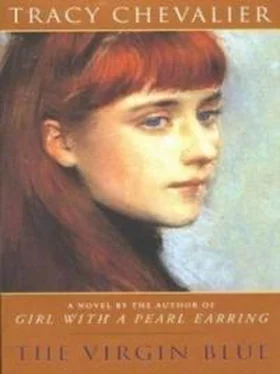
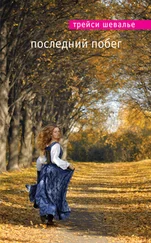
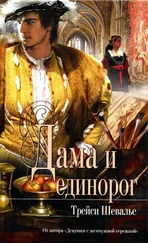

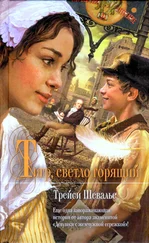
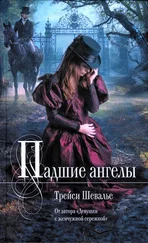
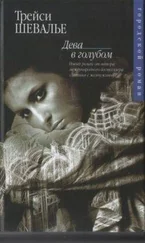
![Трейси Шевалье - Тонкая нить [Литрес]](/books/386177/trejsi-shevale-tonkaya-nit-litres-thumb.webp)
